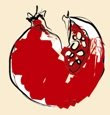Brain-Tickling Reads
A brain-tickling read is a book that isn't merely funny, doesn't just have a good plot or characters, but goes beyond. A brain-tickling book is a book with fantastic writing and zingy one-liners, along with interesting characters or plot. A book that tickles my brain is a book that makes me want to underline pages, and a book that makes me shake with barely-controlled laughter in places like airplanes. It is a book with sentences that reach into my brain and noodle around in there. Sentences that give you a little shiver-making you want to read them again. Here are some of my favorite brain-tickling reads, of late.
Spooner
Every now and then I'll pick up a book that reads so comfortably because the writing is so close to my regular thinking patterns. Maybe not the individual words. (Spooner does have some language that could be considered offensive.) More like the cadence, pacing, timing or wit. Pete Dexter, the author, has a DRY sense of humor. His writing reminds me of my jangled up, tangential stream of conscious thoughts, and the way one of my ex-boyfriends talks. I wouldn't want to spend my life with Pete Dexter, but I'm enjoying stepping into his world for a bit. Not unlike reading my ex's Facebook posts, after being out of touch for several years. I knew there was a reason we got along so well.
Here are some of my favorite zingers from the book so far:
"As far as recreation went, that was about it for old Fuzz. One attempted murder." (Spooner's family dog)
"Spooner was sitting in the hallway beside his locker with one foot bare, attaching a Band-aid to a toe blister, when he apprehended a certain menace in the milieu, as Calmer might say, and looked up to find Russell Hodge standing over him, looming up there in the hallway's artificial light, and experienced in that moment a clear perception of himself as a lawn mower and Russel Hodge as a mower of lawns, about to set his boot on his chest to hold him in place while he grabbed the starter cord and yanked off his head."
"The thought had occurred to Spooner previously, usually sitting around the same anonymous newspaper bar, listening to reporters grumbling over a changed word or phrase in a lead paragraph, that what the world needed these days was more discouragement than it was getting at home."
"The teacher was named Miss Julie Tuttle and stopped him dead in his tracks. Miss Tuttle had black hair that shone like Calmer's shoes and smelled like flowers, and Spooner wanted to roll in that smell the way the Shakers' coonhound rolled in cow (poo) after he'd been in the pond."
Anything by Susan Orlean
Susan Orlean is my favorite nonfiction writer. If I could be any writer on the planet, I'd be Susan Orlean. She writes for The New Yorker, and is the best-selling author of The Orchid Thief. Her two books of essays, The Bullfighter Checks her Makeup and My Kind of Place, put you right in the middle of her travels around the world.
Susan Orlean is the Mike Rowe of nonfiction. She visits people/businesses/places that do/sell/represent fringe-ish things, and writes about them like they are as common as peanut butter and jelly sandwiches, yet with a sense of delight, appreciation, and humor. She manages to simotaneously wink at the reader and maintain an entirely straight face toward her subject, exhibiting true sincerity to both.
Her latest piece in The New Yorker was about mules. I follow Orlean on Twitter, and I remember her tweeting about trying to get to the mule school during the big snows this winter. I wondered what it was all about, and when I opened my latest magazine, I found the article "Mules in the Modern Military."
Orlean visited mule training camp in California, and opened the article with this:
"A mule is entirely nonpartisan about the contents of its load. It will carry as much as three hundred pounds, seven hours a day, twenty days straight, without complaint." Then, Orlean goes on to describe that a mule's intelligence is sometimes interpreted as stubbornness, but is really self-preservation, and cites the Mule's reluctance to jump out of airplanes into war zones as an example.
I don't have the magazine with me, so I can't include Orlean's other brain-tickling quotes, but she gives the same treatment to a taxidermists' convention, and a profile of the Surfer Girls of Maui, an article which served as the inspiration for the movie "Blue Crush." Which inspired me to learn to surf. Here's a bit from that article:
"The Maui surfer girls love each other's hair. It is awesome hair, long and bleached by the sun, and it falls over their shoulders straight, like water, or in squiggles, like seaweed, or in waves. They are forever playing with it — yanking it up into ponytails, or twisting handfuls and securing them with chopsticks or pencils, or dividing it as carefully as you would divide a pile of coins and then weaving it into tight yellow plaits."
See? She does such a great job making the ordinary, extraordinary and the extraordinary, ordinary. We can all be surfers, yes?
What are your favorite brain-tickling books?




No comments:
Post a Comment